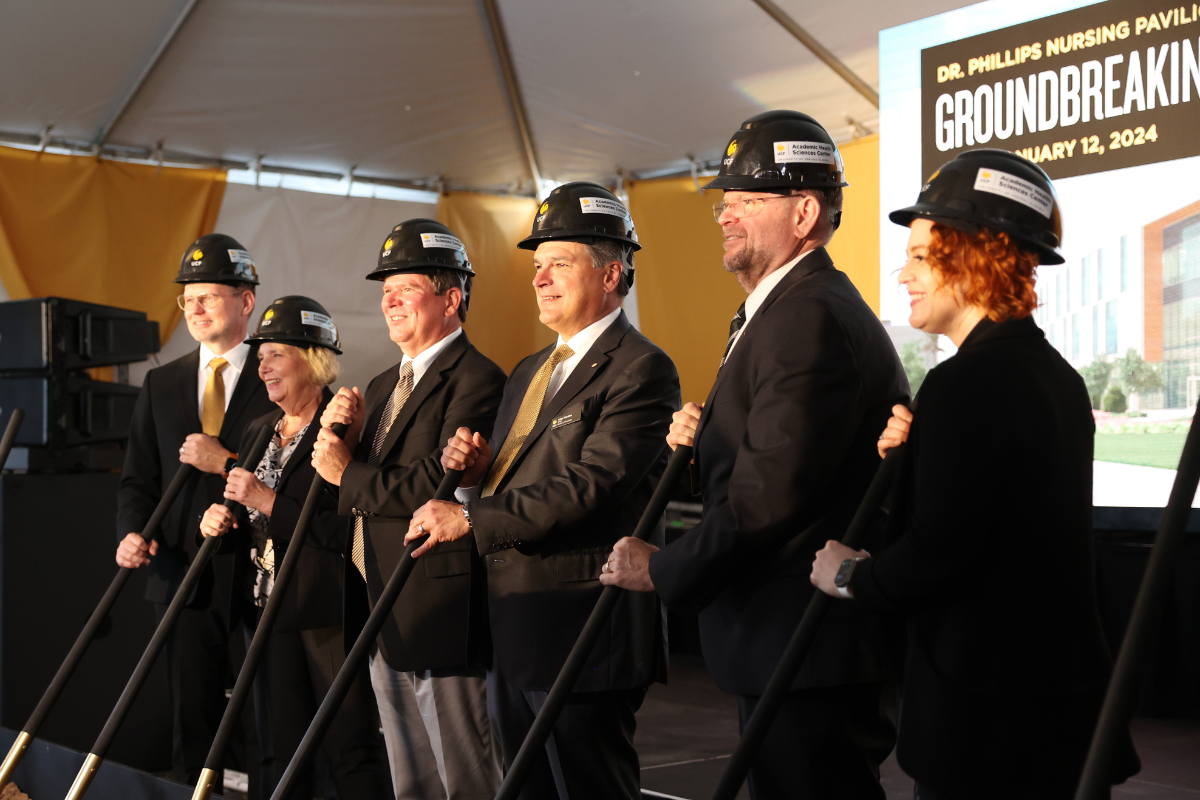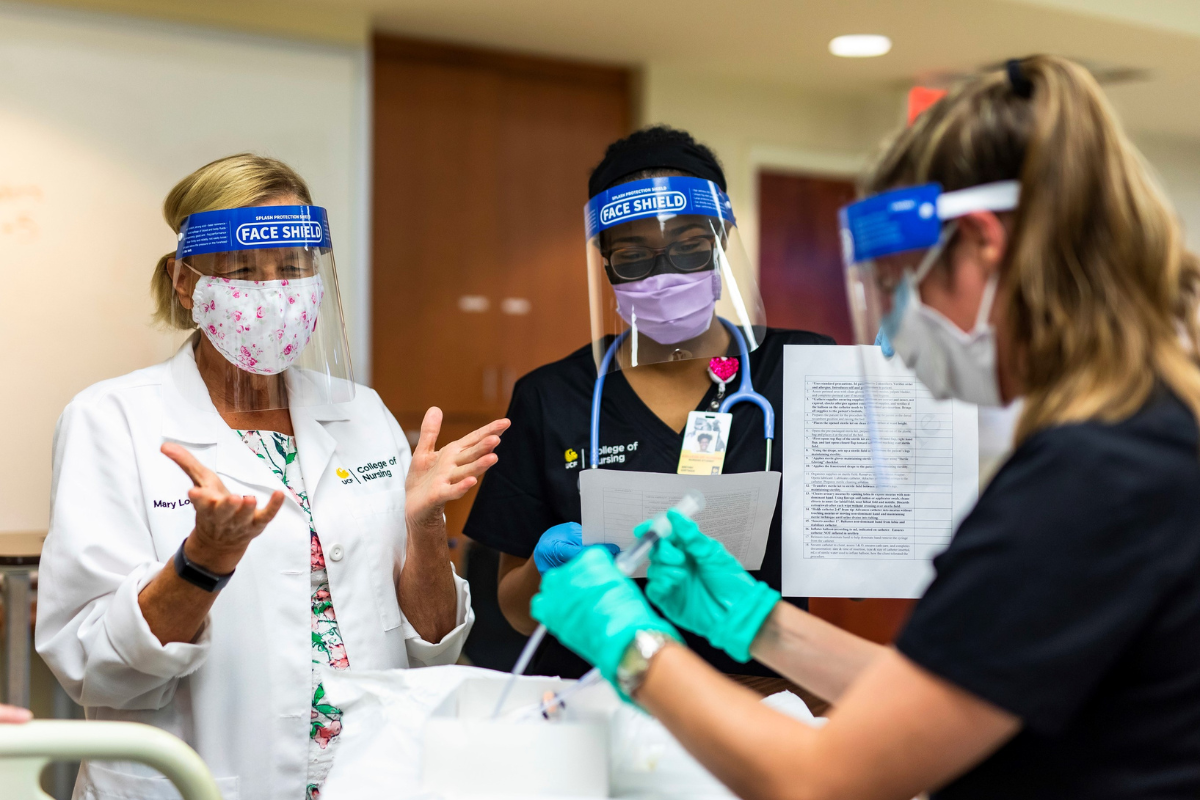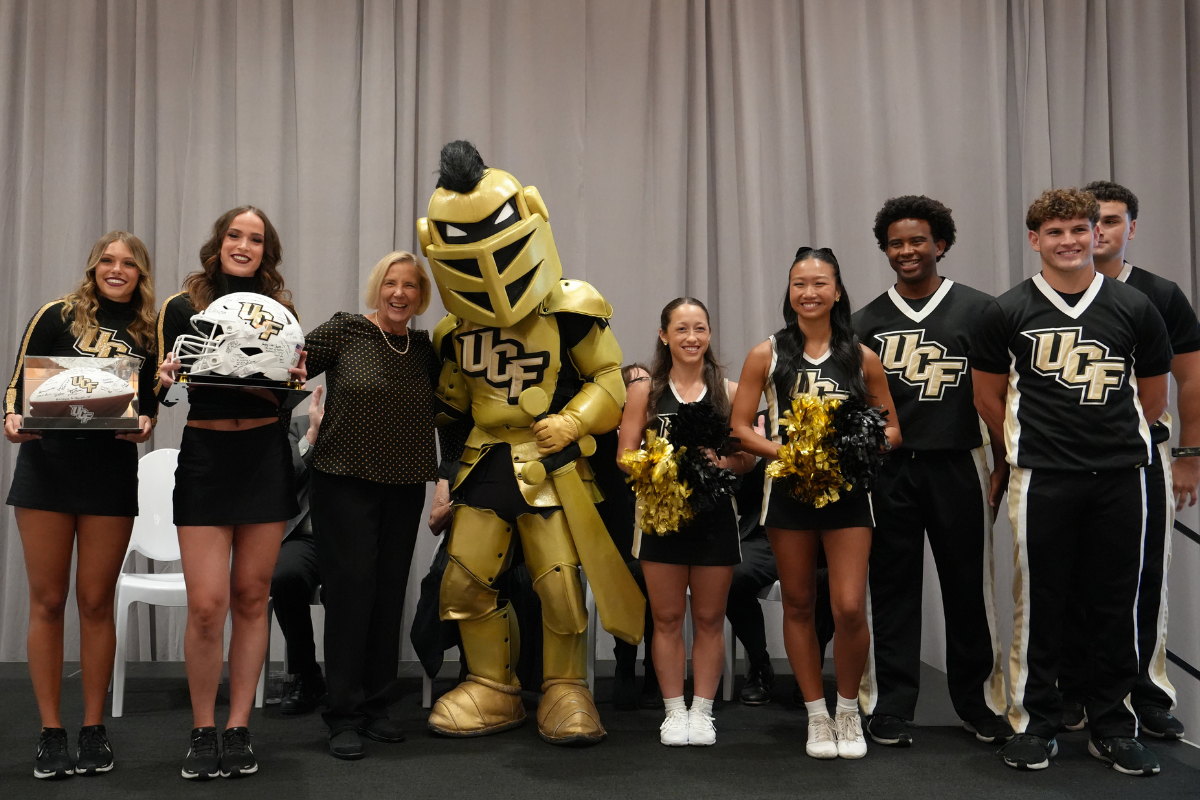By Julie Harper ’01
As she prepares to Charge On to retirement, Dean Mary Lou Sole reflects on more than three decades at UCF and shares words of wisdom for the future.
Mary Lou Sole, dean of UCF’s College of Nursing, will retire this summer after 34 years of service to the University of Central Florida and 50 years in the nursing profession.
When Sole joined UCF in 1991, the nursing program was a small department using classroom space anywhere they could get—from portable classrooms to the (then) athletic building where athletes trained next door. At that time, UCF had admitted its largest cohort of nursing undergraduates — 60 students.
Today UCF’s College of Nursing is nationally recognized with programs from the bachelor’s to the doctorate, with more than 2,700 students, and will move into a much-anticipated state-of-the-art new building this fall.
As both the Dean and a faculty member, Sole has played a pivotal role in making UCF’s nursing program what it is today. It is a reflection of her heart and soul, and her impact will be felt for generations to come.
Ten years ago, upon being appointed Dean of the College of Nursing, your vision for the future was to foster innovation, collaboration and technology to become a national leader and your goal was to move the college to Lake Nona. Reflecting back, you’ve achieved these goals and so much more. What are you most proud of?
I’m proud of everything we’ve achieved. It’s the result of a strong team effort and focused strategic thinking—keeping an eye on our goal—planning, and execution.
One visual reminder of my legacy will certainly be the Dr. Phillips Nursing Pavilion, but more importantly, what it holds. I’m proud that we will have a facility that is focused on learning, innovation, and collaboration. It will enable us to continue our legacy of excellence in education, technology, research and practice. It’s opening new doors for continued growth.
What were the biggest challenges you faced as dean?
As nurses, it is in our nature to use critical thinking to solve problems, and to turn challenges into opportunities. We constantly ask, what’s the problem, and how can we take care of it?
One challenge and also an opportunity, was hiring the right people into the roles that can support us not just in that immediate moment, but in the future. You have to have the right team to get the job done.
For the building, the challenges over the years were budget related. When the nursing shortage became a major talking point, it was a turning point. UCF received PIPELINE funding from the State of Florida in 2022 along with support for a new learning space. This funding was transformative.
The pandemic certainly presented its own set of challenges and opportunities in higher education, but also with the building. Although we had been working on building designs for several years, the pandemic caused us to re-think those ideas to create more collaborative and flexible spaces. I think it’s a much better design now.
The timing of the funding for the building ended up being optimal, and also comes at a critical time when our communities need more Knight nurses.
Did your vision change or evolve in the last decade?
I don’t think it changed. I have always been focused on maintaining excellence in all areas: education, research, simulation and technology, and practice.
It is also expecting everyone at UCF nursing — faculty, staff, students and alumni — to reach for the stars and achieve success at their maximum potential.
You’re retiring as the new building is opening. What went into making that goal a reality?
What most people don’t know is that we were planning space needs since 2015. We examined our space needs each year and collaborated with the UCF architects to help us update the building program. Having those initial steps underway was critical to moving forward quickly once we received the state funds supporting the building.
Then, Dr. Phillips Charities came forward as the founding donor and it quickly became a reality. I’ve worked closely and collaboratively across the university and with our advancement team, as well as with our partners, the community and donors to advocate for the $40 million we received from the State of Florida and to raise the $28 million in private funds needed for this project. It has been a great team effort.
In your own words, why is the building so important to the community?
This is going to be a state-of-the-art space that will enable nurses to apply technology to their learning and to be able to collaborate with other disciplines to be the best nurses they can be.
It will also allow us to educate more Knight nurses to make a direct impact in communities across the state, as a majority of our graduates stay in Florida.
UCF is excellent at educating nurses—from undergraduate to doctoral graduates. We’re going to continue to do that.

Why are community partnerships so important to the College of Nursing?
Partnerships have been important all along the way and we’ve continued to grow them.
Clinical partnerships with Orlando Health and Florida Hospital (now Advent Health) were in place when I was hired. These Pegasus Partners have been supporting us for decades and helping to ensure our students have strong clinical experiences. The college has also added more community partners and Pegasus Partners along the way including Nemours Children’s Health and Addition Financial.
But not all healthcare occurs in a hospital setting, so our community-based curriculum and partners are also important. Those community experiences help students think about where an individual comes from before they are treated in an acute setting and where they will be returning to when discharged. They also allow nurses to identify what we can do to make our communities healthier.
What are three words you would use to describe your leadership style?
Collaborative, empowering and visionary.
I have encouraged collaboration throughout the college and beyond, embraced UCF’s vision to unleash potential by encouraging everyone around me to grow, learn and be their best, and had a continuous focus on excellence to ensure a bright future.
What were your first impressions and early memories of UCF?
My husband and I moved to Orlando in 1991 for his job. I had previously worked in Texas at an academic health sciences center, and at the time, had never even heard of UCF. But it’s been the best decision we ever made.
At that time, nursing was on the main campus. It was fun to see the college campus experience of students up close and witness that collegiate community.
After interviewing in a chemistry wet lab, I was hired for a visiting position. I didn’t realize at the time that it was only a temporary position. But I took it, knowing if I did a good job, I would find a way to stay.
Over the years, I’ve taught in nearly every program, across all campuses, and in every format. But I think the hardest thing I had to do was teach fundamentals to new nursing students. I was assigned that in my first year at UCF. It was something I had not done before and it taught me patience—which I still must work on!
Now how would you describe UCF?
UCF has been a great place to work. For me, UCF truly stands for opportunity. It has given me the freedom to grow as a leader, researcher, educator and scholar. It has encouraged a “can do” attitude.
Witnessing the massive growth of the university has been amazing. It has evolved from a regional school to one that attracts the best and brightest students from across the state and nation.
What is your favorite memory from your time at UCF?
That’s a tough one as I have been at UCF for 34 years. Within the nursing program, some of the most notable memories are the growth milestones I’ve been a part of, such as launching the master’s degree in nursing program and the nursing Ph.D. program. I remember traveling to Tallahassee to advocate for the Ph.D. program. That was a proud moment.
You’ve been a nurse for 50 years. What attracted you to the profession initially, and what has kept you in it?
When I was growing up, a woman had few career options — secretary, teacher and nurse. I was drawn to nursing because both my mother and grandmother were in the profession.
Nursing has evolved over the years. I’ve also seen nursing curricula transform and programs expand. The profession is more respected now.
Nurses are stronger and more focused on critical thinking, but their people skills, compassion and empathy have remained steadfast.
In academia, what also has never changed is the students. I love seeing the outcomes of their learning, and challenging people to do things they never dreamed possible.
I believe no other profession offers as many opportunities. In nursing you can make a difference and follow your passion whether that’s patient care or education, research or leadership and do so in a variety of settings and patient population.

What qualities do you think are important in nurses?
Nurses today must be critical thinkers, strong communicators, assertive, and be able to collaborate across disciplines.
What is one piece of advice you would offer for an incoming nursing student to UCF?
I would tell them to focus on learning and study hard to be the best Knight nurse they can be because someone’s life will depend on them.
I also would tell them to take advantage of opportunities. My journey has been shaped by someone tapping me on the shoulder and challenging me to take the next step. So, when someone taps you on the shoulder, take the opportunity. You never know where it might lead.
You continued to mentor students involved in research as dean. Why was this important to you?
Research, scholarship and teaching are all very important to me and activities that I have loved in my career. Seeing the success of students progressing in their education, sharing their work (both undergraduate and graduate), publishing and being awarded grant funding gives a sense of personal growth and development, and are very rewarding. It was important to me to continue those activities and mentor future generations.
Those activities have also kept me energized as dean. I could take a break from administrative paperwork, for example, and edit an article, write a grant or analyze data. Those activities kept me engaged and well-rounded in my position.
As a researcher, you have focused your work on preventing complications and improving outcomes of critically ill patients on a ventilator. What inspired that work?
Early in my education as a nurse, a faculty member taught me the importance of managing the patient on the ventilator with oral care, suctioning, and other practices that lacked evidence and research to support. I was inspired by that and have been passionate about it ever since.
When I began to conduct research, most critical care nurse researchers at the time were focused on cardiovascular health. I decided to go the pulmonary route to focus on the airway. I feel like I’ve made a lot of contributions to best practices in my career, but there is still much more work to do. We still lack a lot of evidence in that field.
What has been your greatest research contribution or finding?
There hasn’t been one grand finding, but it’s the collective result of all of my findings. They have all been incremental and build upon each other to create best practices.
It’s looking at the practices for managing the patient who requires a ventilator, including devices. I’ve studied the endotracheal (breathing) tube itself and how to better manage it, oral suctioning to remove secretions, and even looking at microbiomes (bacteria) like we’ve done recently. The work keeps building and I look forward to seeing it continue.
You’ve accumulated a long list of accolades throughout your career. What achievement means the most to you?
From a professional standpoint, two stand out to me. The first is the Sigma International Nurse Researcher Hall of Fame. That was the top honor I could achieve as a researcher. I had never even dreamed I would be eligible for it. A very small number of nurse researchers worldwide have achieved that global honor (approximately 300 to-date).
The second is receiving the Master of Critical Care Medicine designation from the Society of Critical Care Medicine this past year. I was one of only two nurses this year to receive the honor. It means a lot to me as a nurse as not many nurses are in that group and as a woman because women are underrepresented in critical care medicine as authors and researchers.
However, the awards from the student organizations also mean a lot. Those show where you’ve made your impact.

What has been the best part of your job?
I have a hard time narrowing it down to one thing because so many great things have happened and there have been so many accomplishments as we’ve discussed already.
If I had to choose one thing, I would say that the people have been the best part — the students, the faculty and staff, the community, the donors, the hospital partners, and everyone I have met along this incredible journey.
As an educator you impact students in the classroom, but when you’re leading the college, you have the opportunity to make a greater impact.
I think about the number of patients that will be cared for by Knight nurses and the lives that will be touched because of the collective impact of supporting faculty, staff, the community, and the students. It’s immeasurable.
What’s next for you personally?
I’ve worked for 50 years. It’s been a great ride. But when you’ve worked that long and not really had a break, you first need rest. I plan to enjoy a slower pace while I take time to figure out my next chapter.
Whatever that looks like, I’m looking forward to it. I know it will involve spending more time with family and others, and pursuing hobbies that I haven’t had time for such as painting, reading and learning a foreign language.
By the Numbers: Dean Sole’s Impact
8,734
Nursing Degrees Conferred as Dean
2,7801
Nursing Students Enrolled
114%
Increase in Faculty Experts
83
Students Advised in Research
$68M
Support from the State of Florida and Private Donors for the Dr. Phillips Nursing Pavilion
12
Years at the Helm of UCF Nursing
9
Editions of a popular college textbook, now called Sole’s Introduction to Critical Care Nursing
$4M
Funding Awarded for Critical Care Research
1As of Spring 2024
Has the UCF College of Nursing Positively Impacted You?
The mission of the College of Nursing at the University of Central Florida is to prepare nurse leaders and patient advocates through excellence in education, research and service.
Find out how to give back to your college, today!